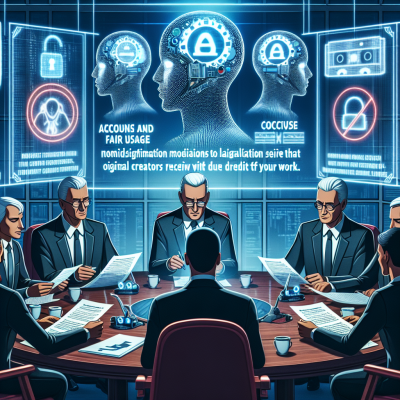
Government Bows to Pressure with New Concessions in AI-Copyright Legislation
In a move that signals growing awareness of the cultural and creative concerns surrounding artificial intelligence, UK government ministers have responded to mounting pressure by including key concessions in their flagship AI copyright bill. The revised legislation comes ahead of a decisive parliamentary vote and follows intense lobbying from industry stakeholders, including some of the country’s most prominent artists.
High-Profile Backlash from the Creative Community
The AI copyright bill has sparked fierce criticism from within the creative industries, with widely respected figures such as Sir Paul McCartney and Sir Tom Stoppard publicly voicing their concerns. At the heart of the controversy is the fear that generative AI tools could undermine intellectual property rights by using creative works as training material without due credit, payment, or permission.
According to representatives of affected industries, the rise of AI-generated music, writing, and visual art has already blurred the lines between original content and machine-produced derivatives. Artists argue that unchecked AI development threatens the very foundation of authorship and the ability of creators to earn a fair living.
What the Concessions Mean for Artists
In response to these concerns, ministers have now added several key amendments to the bill, aimed at acknowledging—and to some extent protecting—the rights of original content creators. These include:
- Stronger transparency requirements for companies developing generative AI tools, requiring disclosure of datasets used in training models.
- New licensing mechanisms that allow artists and rights holders to opt in or out of data harvesting for AI purposes.
- Government review clauses mandating periodic evaluations of the law’s effectiveness and impact on creators.
While some campaigners welcomed the changes as an indication that the government is listening, many artist groups remain cautious. The fear now is whether these measures go far enough or if they simply offer surface-level appeasement.
The Broader Battle: AI Vs. Copyright
At the crux of the debate is the unprecedented challenge AI poses to copyright protections. Generative AI tools, such as those producing music, literature, and visual artworks, require enormous datasets for training—often scraped from publicly available content, including songs, plays, and paintings, much of which is copyrighted.
As AI technologies continue to evolve, rights holders have called for stronger protections to ensure that the ethical and financial implications of these tools are adequately addressed. Their concern: allowing companies to use creative outputs without consent erodes both the economic rights and moral rights of human creators.
Voices from the Industry
In a joint letter earlier this year, over 100 prominent artists across genres petitioned the government to halt the legislation until greater safeguards were introduced. The signatories argued that without substantial reform, the bill risks handing tech firms a “blank cheque” to exploit copyrighted materials, jeopardizing the livelihoods and creative control of artists across the UK.
One anonymous industry insider told The Guardian: “We aren’t opposed to innovation—but innovation shouldn’t come at the cost of devaluing culture.”
A Balancing Act
The government’s decision to introduce last-minute amendments makes clear that ministers are attempting to walk a tightrope—encouraging AI innovation while avoiding a cultural backlash. These changes appear to be an attempt at compromise, making the legislation more palatable to both the tech industry and the creative sector.
“Developers must be given room to innovate, but not at the cost of the artists whose work provides the foundation,” said a cultural policy analyst. “The updated bill is better, yes—but the devil, as always, will be in the detail.”
Looking Ahead
The bill is now set for a crucial vote in Parliament. If passed, it will mark a pivotal moment in the UK’s digital future, determining to what extent copyright and AI can coexist in a rapidly technologizing world.
Whether the new concessions satisfy critics or set the stage for further controversy remains to be seen. But one thing is certain: as generative AI tools become ever more sophisticated, the conversation around intellectual property rights in the digital age is far from over.
Conclusion
The last-minute changes to the AI copyright bill reflect a growing recognition of the importance of creative labor in the age of automation. As the UK stands at the crossroads of innovation and cultural preservation, this legislation will likely serve as a litmus test for how democratic societies adapt to technologies that reshape the very definition of creativity.
For artists, policymakers, and tech developers alike, the next few months will be critical in determining how the balance between AI progress and copyright protection will be struck—not just in Britain, but potentially across the globe.


Leave a Reply